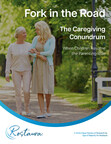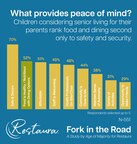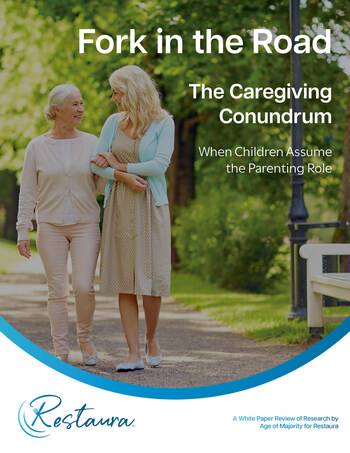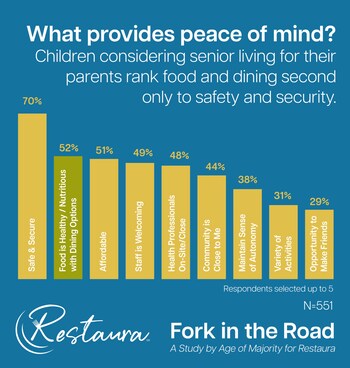Restaura's Fork in the Road study exposes a generational role reversal, with adult children providing emotional support and leading decisions about their parents' care. The research also reveals how the link between food and longevity is shaping those choices.
WALTHAM, Mass., Nov. 3, 2025 /PRNewswire-PRWeb/ -- In recognition of National Family Caregivers Month, a new national study commissioned by Restaura and conducted by Age of Majority reveals how America's caregiving landscape is being redefined by Gen X and Millennial adult children who are primary decision makers in determining how and where their parents age.
The study, titled "Fork in the Road: The Caregiving Conundrum," explores the emotional and practical realities facing adult children as they assume caregiving roles for aging parents. The findings highlight both the love and strain of this generational role reversal — and expose a surprising factor shaping decisions about senior living: food. The National Council on Aging (NCOA) created National Family Caregivers Month in 1994 to celebrate family caregivers.
"We're witnessing a generational handoff unlike anything before," said Joseph Cuticelli, Restaura Co-Founder and Chief Executive Officer. "Today's adult children are guiding how and where their parents age, and they're doing it with a new understanding that food, health, and longevity are deeply connected. It's changing the very definition of care."
America's Caregiving Shift
According to the NCOA, more than 53 million Americans now provide unpaid care to an adult — most often a parent. The Fork in the Road research, which surveyed over 1,200 U.S. adults ages 45 and older, adds critical new insight into how this dynamic is evolving.
- 83% of children who are not currently caregivers expect they'll need to provide care for a parent in the future.
- 87% of children caring for a parent say "emotional support" is the most common form of care they provide -- even more than medical or physical assistance.
- The most common word caregivers use to describe their parents is "stubborn."
When asked about preferred living arrangements if a parent required care, 7 in 10 adult children indicated they would opt for a senior living community over having their parents move in with them, if cost was not a factor. Surprisingly, this preference comes despite the fact that 70% of caregivers live within an hour of their parents, and nearly half live within just 15 minutes. Proximity doesn't translate to capacity as most adult children are balancing careers and families and recognize that senior living communities may offer the care their parents need.
Yet outdated perceptions linger. Many GenX and Millennial children equate senior living with institutional care and cafeteria-style dining, which often delays conversations until a health event or crisis forces immediate action.
Food: The Hinge Point of Trust
Perhaps the most eye-opening finding in the Age of Majority research is the role of food in caregiving decisions. When asked what most affects their parents' health and well-being, food and nutrition ranked #1 -- ahead of social connections, purpose, and even health conditions.
Today's generational shift helps explain why. While the Boomer and Silent generations were raised in the postwar era of processed, frozen, and convenience foods their children have witnessed decades of research linking those same foods to chronic disease, obesity, and reduced longevity. They've lived through the rise of clean eating and the growing awareness that health is built on what we eat.
This mirrors the work of Dr. Peter Attia, author of Outlive: The Science and Art of Longevity, who champions "healthspan," which he defines as not just living longer, but living better. Attia's philosophy, echoed in the Fork in the Road research, underscores food's power to extend healthy years by prioritizing whole, nutrient-rich meals.
That belief is shaping caregivers' decisions. Nearly one-third of survey respondents said poor food quality or dining experiences would disqualify a senior living community entirely. And among those whose parents already reside in senior living, satisfaction with food ranked lowest among all measures of quality of life — behind safety, staff, and activities. These findings reveal a growing culinary confidence gap: families know that food drives health, but they don't yet trust senior living to deliver it.
To bridge that gap, Cuticelli suggests the senior living industry must elevate dining as a measure of care and credibility. Restaura, a dining services management company, is helping to lead that shift. As co-author of the International Council on Active Aging (ICAA) Culinary and Hospitality Standards of Excellence, the company has helped to establish the industry's first comprehensive benchmark for culinary performance, wellness-driven nutrition, and hospitality standards. ICAA and Restaura recently launched the Plate of Distinction, a Michelin-style recognition program honoring senior living communities that perform at the highest levels of culinary and hospitality excellence.
"Today's families see food as health, hospitality, and humility all at once," Cuticelli said, "By creating clear culinary standards and celebrating excellence, we're helping caregivers feel more confident in their choices."
Download the Fork in the Road white paper to learn more about the research findings at https://restaura.com/white-paper-fork-in-the-road/.
About the Research
Restaura commissioned Age of Majority in April 2025 to survey more than 1,200 U.S. adults ages 45+ with household incomes of $50K+ in three distinct categories: 551 were actively providing care to a parent, in-law or grandparent not currently in a senior living community; 583 were not yet caregivers but had living older parents; and 141 respondents identified as providing care to a parent, in-law or grandparent who resides in assisted or senior living. Care recipients were by far most likely to be the mother or mother-in-law of the survey respondent (8 in 10).
About Restaura
Restaura is leading a transformative movement in the food and dining management industry, setting new standards for senior living and active aging communities. Driven by innovation, Restaura leverages a culture rooted in employee ownership with a datadriven operating model to craft unapologetically delicious℠ dining experiences. For more information, visit www.restaura.com or follow @restaurahospitality.
Media Contact
Karen O'Neil, Restaura, 1 5084048817, [email protected], www.restaura.com
SOURCE Restaura







Share this article